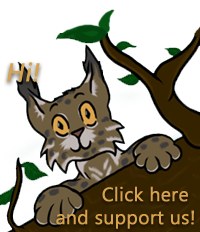THE DONATIONS
THE «NATURAMA» PROJECT WANTS TO HELP VERY DIFFERENT KINDS OF ANIMALS
Please find presented all actions that will be benefited by the «Naturama» Project.
In the case of wishing to get to the individual homepage, you will find the link as well.
Out of these ten actions the artists are going to choose one or more of them,
which they want to support by drawing. You can find out what project they have chosen
by taking a look at the artists list.
This year our campaign animal is the lynx «Rufus».
Therefore, 15% will be deducted from each donation and donated to the Harzklub e.V.
donated to reforestation measures in the Harz Mountains.
THE CURRENT DONATION POOLS
THE RACE HAS BEGUN!
Here you can take a look onto the amounts, which the animals will currently receive
from the «Naturama Projekt ».
Support your favourite animal and order a commission by an artist,
who wants to draw for the animal of your choice.
You will find the information about the artists in the list of artists.

